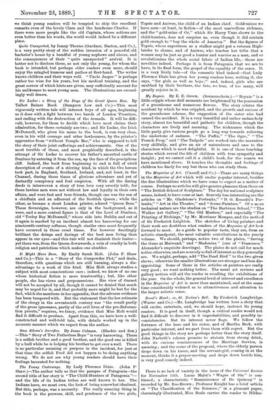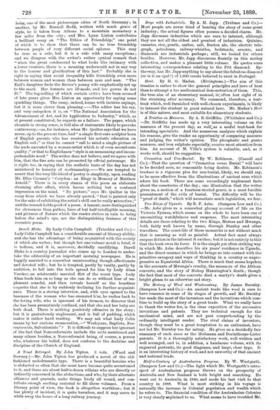There is no lack of variety in the issue of
the Universal Review for November 15th. Lucas Malet's " Wages of Sin " is con- tinued ; a characteristic " Reminiscence of De Quincey " is recorded by Mr. Rae-Brown ; Professor Knight has a brief article on " The Classification of the Sciences ;" in a pleasant paper, charmingly illustrated, Miss Beale carries the reader to Hildes-
heim, one of the most picturesque cities of North Germany ; in another, by Mr. Rennell Rodd, written with much grace of style, he is taken from Athens to a mountain monastery a few miles from the city ; and Mrs. Lynn Linton contributes a brilliant essay on "The Ethics of Friendship," one point of which is to show that there can be no true friendship between people of very different social spheres. This may be true as a rule, but it is a rule with many exceptions ; and we disagree with the writer's rather cynical remark that " when the great condescend to what looks like intimacy with a lower creature, there is a meaning underneath not in any way to the honour and glorification of this last." Probably she is right in saying that social inequality kills friendship even more between woman and woman than between man and man. "The Earl's daughter finds the Rector's young wife emphatically not up to the mark. Her bonnets are ill-made, and her gowns do not fit." The log-rolling of which certain critics have been accused of late years gives Mrs. Linton an opportunity for saying some sparkling things. The essay, indeed, teems with incisive sayings, but it is more clever than pleasing.—The editor has his say, and very outspoken it is, on "The National Association for the Advancement of Art, and its Application to Industry," which, as at present constituted, he regards as a failure. The paper, which abounds in strong sense, is full also of statements likely to provoke controversy,—as, for instance, when Mr. Quilter says that we have never, up to the present time, had " a single first-rate sculptor born of English parents who has received his artistic education on English soil ;" or that he cannot "call to mind a single picture of the nude executed by a woman-artist which is of even second-rate quality ;" or that to Englishmen " style is an unmeaning and incom- prehensible word." The writer does not believe, and we agree with him, that the fine arts can be promoted by official patronage. He is right, too, in saying that the aesthetic taste of the day has not ministered to honesty of workmanship.—We are tempted to assert that the very life-blood of poetry is simplicity, upon reading Mr. Bliss Carman's " Corydon : an Elegy in Memory of Matthew Arnold." There is in every stanza of this poem an elaborate straining after effect, which leaves nothing but a confused impression on the mind. " No picture," says Mr. Quilter in the essay from which we have already quoted, "that is painted only for the sake of exhibiting the artist's skill can be really attractive ;" and the remark holds good of a poem. A lament, more distinguished for cleverness than pathos, lines of but half-intelligible meaning, and pictures of Nature which the reader strives in vain to bring before the mind's eye, are the distinguishing features of this eccentric poem.







































 Previous page
Previous page